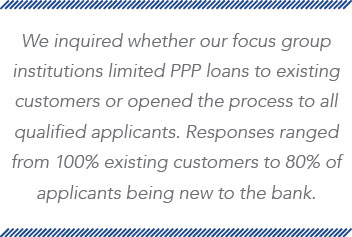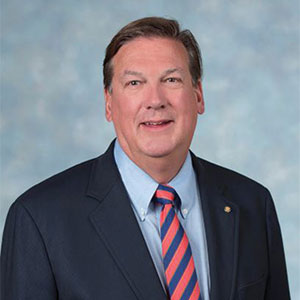By Gary Shook, Community Bankers’ Bank
In sitting down to write this article, I am reflecting upon what a year 2020 has been. We know 2021 will be different from 2020 but cannot predict the highs, the lows and the challenges coming our way next year.
We, as individuals, are fortunate to be living in a resilient democracy. We, as U.S. citizens, are resilient. Because of our resiliency, our banking system is also resilient. Regardless of the ups and downs of economic cycles and the effects they elicit, our banking system has always, in the end, remained a source of financial strength. With that said, we at Community Bankers’ Bank (CBB) were curious as to how our bankers in the Fifth Federal Reserve District are processing the moving parts and pieces that 2020 has handed us thus far.
In late September, using an independent moderator, CBB convened several Zoom focus group calls consisting of banking executives from across the 5th District. We were eager to hear what they have experienced. We wanted to hear where they think the industry is going. In general, we wanted to listen to the good, the bad, and even the ugly, and that’s what we heard. I want to share their opinions about our current circumstances, coupled with some reflection and forward-thinking.
CARES ACT/Payroll Protection Program
There was universal agreement within our focus groups that the Payroll Protection Program (PPP) brought new business opportunities to the community banking sector. Community banks offered a much-needed lifeline to small businesses within their communities, despite evolving PPP guidelines that were difficult to navigate the issues with the SBA loan application portal. Banks sprinted to deploy capital to small businesses when they needed it most. Bankers who participated in PPP were grateful to fellow employees, as well as their boards, for the nimbleness they exhibited by pivoting quickly to meet PPP demand.
We inquired whether our focus group institutions limited PPP loans to existing customers or opened the process to all qualified applicants. Responses ranged from 100% existing customers to 80% of applicants being new to the bank. With that said, a significant percentage of PPP loans were made to existing customers among our participants.
Bankers are working hard to “onboard” new relationships. With many retail and commercial banking offices being closed (due to COVID-19), keeping these new customers might be problematic. Some banks have tied sales goals to retaining new PPP customers. Others send weekly newsletters and various marketing communications to draw in new prospects and generate interest in a broader array of products and services.
When we questioned our focus groups as to guidance on PPP loan forgiveness, there was generally a dim view about the process. Some have elected to utilize technology to assist with forgiveness, but most banks plan to use existing resources. The SBA has made allowances for smaller loans of $50K or less. Our bankers are hopeful these loans will be forgiven, but there has been no legislative fix to ensure that. They hope small businesses and community banks are not put through more undue stress and aggravation. All focus group participants were eager to get the forgiveness aspect behind them.
Bricks and Mortar Branches Versus Mobile Banking
Most of the bankers said that considering the changes in delivery brought about by COVID-19, they would need to take advantage of growth opportunities. These may exist in branch structure and delivery.
Early in the pandemic, all focus group participants closed their retail banking offices to foot traffic. Our bankers indicated that there had been little complaint in many cases, mostly because drive-up or walk-up banking options remained open. Many of our bankers said their customers were comfortable with “by appointment only” hours, and they would probably continue to offer that option on a go-forward basis. Customers welcomed and moved quickly to adopt mobile technology.
This begs the question as to changes in branch staffing going forward. Are there changes that need to be made? Do we need to outsource processes and procedures more aggressively? This appeared to present the great conundrum. Concerns were expressed as to the difficulty of maintaining culture with many staff members working remotely. Employee engagement and productivity on a go-forward basis is yet to be determined. Historically, attracting experienced and qualified talent can present challenges. Our focus group participants voiced concern about reducing headcount now because quality staff will be critical when banks return to more normal business operations post-pandemic. Focus group participants noted that mortgage and commercial bankers are in incredibly high demand.
One of the lasting effects on the banking model after COVID-19 will likely be an increased reliance on technology, especially for internet and mobile banking applications. Technology investments appear especially attractive for payments, lending, and security to ensure consumer data remains safe.

Budgeting and Liquidity
As you would expect, there was quite a bit of discussion on this topic within our focus group as leadership teams are currently building their 2021 Budgets and Strategic Plans. Higher liquidity levels in 2020 vs. 2019 have created challenges in deploying those new funds and maximizing returns. Should excess funds be directed toward loans and securities or retained in cash reserves?
Our bankers and board members at their respective institutions understand these decisions have implications for the net interest margin and income.
The loan portfolio mix was a topic of discussion, especially surrounding hospitality and non-owner-occupied office buildings. Those segments are under particular stress at present. Further discussion centered around loss reserves. Most of our focus group participants are not currently applying CECL standards in the determination of reserves. For now, our bankers’ “gut” instincts were to increase reserves, even given the current resiliency in loan portfolios. This was deemed prudent, given the number of credit unknowns in 2021 and beyond.
How long current rates remain in place was another conversation topic, with the FRB signaling rate hikes are unlikely before 2023. Questions also exist as to budgeting on both sides of the balance sheet. While there was no agreement on every topic, there was agreement among our focus group participants that most banks will present three budget scenarios for 2021 — Maximum, Most Likely, and Minimum.
While we learned a great deal from our focus group participants, these are the key takeaways:
- Community banks obtained new commercial customers because of PPP loans;
- Bankers are unsure how sticky these new commercial relationships will be and have little confidence in the SBA forgiveness process;
- PPP loans provided an opportunity for community banks to demonstrate their concierge approach to customer service versus the big bank approach;
- Budgeting for 2021 is a challenge. It will be difficult for management to provide reliable numbers and projections to their Boards. Creating multiple budget scenarios seems to be the best approach; and,
- Managing the personnel piece during COVID-19 has been one of the most challenging elements.
The final takeaway is that we must all be adaptable, flexible, and willing to embrace change as we move forward into what will undoubtedly be uncharted waters. It is possible that we must be even more proactive and creative in the face of that uncertainty. However, community bankers have demonstrated their resilience and devotion to serving their communities, customers, employees, and shareholders

Gary R. Shook currently serves as president and CEO of CBB Financial Corp and Community Bankers’ Bank, which serves the Fifth Federal Reserve District; namely, South Carolina, North Carolina, Virginia, West Virginia, Maryland, and the District of Columbia. He is a trustee and member of the Executive Committee of the Virginia Foundation for Independent Colleges and a director and audit chair of Shrine Mont, The Cathedral Shrine of the Transfiguration and Conference Center. Mr. Shook holds a Bachelor of Arts degree from the University of Virginia.Contact Gary at gshook@cbbonline.com or 804.794.5885.
This story appears in Issue 4 2020 of the West Virginia Banker Magazine.







